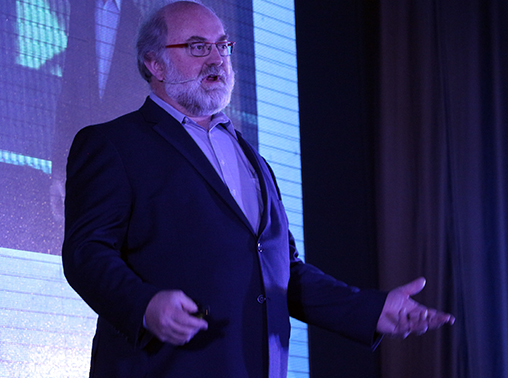Interviewed by the Observatory of Educational Innovation
Thomas Frey is the Senior Futurist at the DaVinci Institute and Google’s top rated Futurist Speaker. He participated in the Second International Congress of Innovation in Education (2015). Thomas Frey raised a number of predictions for 2030. He estimates that the average person will be able to: print their own clothes, live in a printed house, receive packages delivered by a drone, have more than one robot, use a self-driving car, among others predictions.
Observatory: What are the skills students will need to tackle challenges in the future?
Thomas Frey: The skill set that we’re going to need in the future is going to shift into different areas. Some of them will be about being able to work with virtual reality, augmented reality, and big data and also thinking three-dimensionally is I think an important skill for the future. All of these new industries that are being developed are going to shift, morph and change over time and so we have to continually expand our thinking learning techniques and tools that didn’t existed five years ago.
So as a technology evolves let’s just take 3-D printing as an example, 3-D printing is still very crude right now, It’s very slow, very methodical and the number of materials that we’re able to use with 3-D printing is starting to expand very significantly.
And so as this expands, then we’re going to have people that have to become very good at understanding what’s the right material to use for this particular application, I want to create this one part specifically, maybe it’s a part for a jet engine and a jet engine has lots of forces on it that has heat issues, it has pressure issues, it has vibration issues.
And so you’re going to need just the right composite material for that particular application. Having people that know the right material to use at the right time, that’s an interesting skill set that probably nobody has right at the moment. And so as our options increase, then it’s going to be more complicated over time. So, somebody that gets into this field, which is kind of metallurgy field, a new product material, new material development field as that expands over time, the possibilities are many in different directions.
The biggest challenge that educators will face in the future is staying up to date constantly. Every morning I wake up and say, “Okay, what has changed today?”, If I don’t spend at least two hours every day doing research, I’m going to get le behind.
Observatory: What is the biggest challenge that educators will face in the future?
Thomas Frey: One challenge I have is staying up to date constantly. Every morning I wake up and say, “Okay, what has changed today?”, If I don’t spend at least two hours every day doing research, I’m going to get le behind. And that’s the same with the professors, whatever they’re teaching. There are new tool sets, new techniques and there are new challenges in every profession. They need to be on top of all that. And so, we have all the tools for doing all this research. You can do it right at home, you could just work late at night and do that research. But you need to be committed to doing that. So, if you created a curriculum ten years ago and it hasn’t changed, you really shouldn’t be teaching anymore.
Observatory: How can we develop the spirit of innovation in future generations?
Thomas Frey: I think challenges need to be more relevant. I think you need to actually put some real world problems in there that they’re solving. And actually, I love the idea of having prizes that whoever does the best job, they get to claim the victory. I don’t believe in everybody getting the participation ribbon. I think everybody needs to be recognized for what they accomplish. By putting these challenges together, I think that stimulates a lot of interesting thinking. And it creates natural alliances between the students, it tells you how to work on teams, and that sort of things. It ends up being lots of communication issues that you’re dealing with, lots of project management issues, and all of this gets tied in with a challenge like that.
Images:
2do. Congreso Internacional de Innovación Educativa (2015). Retrieved from: https://www.flickr.com/photos/ciietec /page12 2do. Congreso Internacional de Innovación Educativa (2015). Retrieved from: http://ciie.itesm.mx/es/revolutionizingthinking- about-the-future-of-education/
This article from Observatory of the Institute for the Future of Education may be shared under the terms of the license CC BY-NC-SA 4.0 
)
)




)